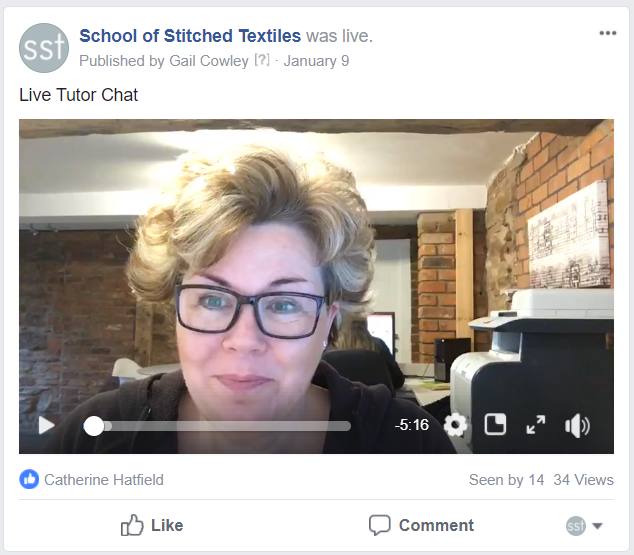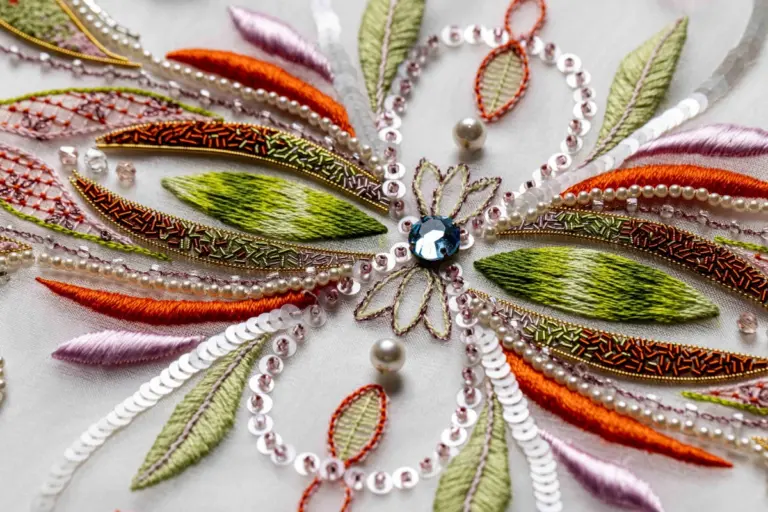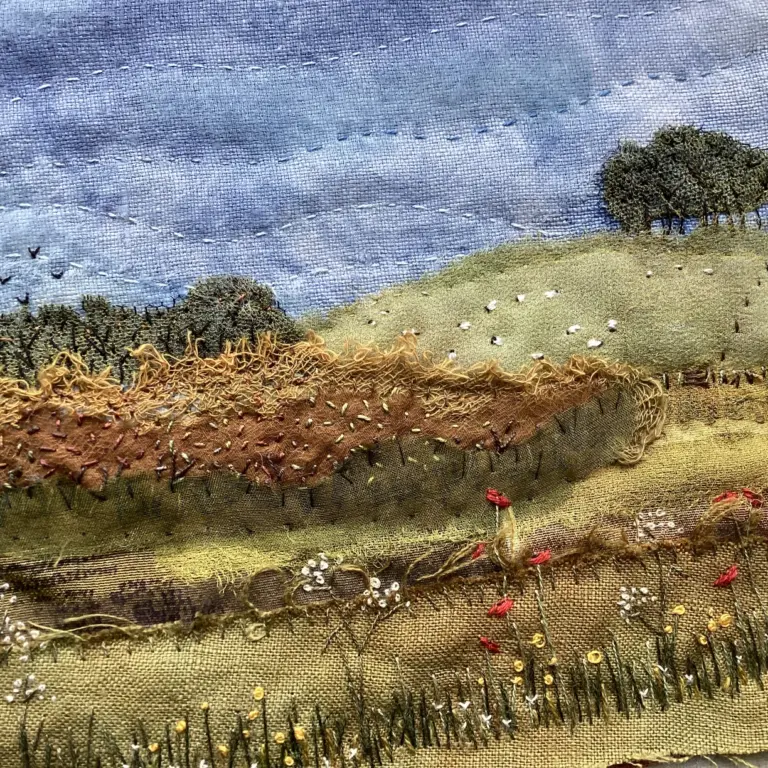Are you still trying to decide which level to study at? As the UKs largest distance learning centre specialising in home-study textile craft courses we know that making a decision about which course to study can be a little overwhelming. To help you with your decision we’ve created a guide to choosing the right City and Guilds accredited craft course based on structure, delivery, length, teaching, assessments and the experience level required for each level.
Course Structure & Delivery
All of our courses are home-study, distance learning or online courses. This means that students study at home by working their way through the course materials issued after enrolment. The course materials are easy to follow and well-structured and are a mixture of written instructions and videos. You will be able to access course materials whenever and where ever you are to allow you to fit your studies in around other commitments.
Depending on the level you wish to study at, each course has a set number of modules to complete and each module has different tasks to complete. Work is submitted electronically to your tutor who will provide written feedback within 10 days of receiving your work.
Throughout your course you will be supported by our tutors who are always on hand to provide guidance, feedback and advice. We also hold regular online live tutor sessions so where you can meet fellow students and share your experiences of learning with us.
Understanding the different ‘Skills Stage’ levels
We refer to the different levels of study as ‘Skill Stages’, which accommodate all levels and abilities, as well as interests.
Short craft courses for beginners
As well as our accredited courses and master practitioner courses we also offer short online beginner courses. These are an ideal way of getting to grips with the basics and learning how to follow along with online tutorials. They also act as a perfect taster of our lengthier, accredited courses. We are constantly adding to our list of beginners courses so go and ahead and check them out now.
City and Guilds accredited textiles courses
Our accredited courses are Skill Stage 2-4 and are fully approved and accredited by City and Guilds of London. Working towards an accreditation by an institution like City and Guilds, ensures that both teaching and assessments are delivered to an extremely high standard, making them highly valuable courses. Read more about the true value of taking accredited courses.
Skill Stage 2
Courses you can study at Skill Stage 2:
Experience Required
Our Skill Stage 2 accredited courses are aimed at beginners. If you’ve only ever made a few projects by following patterns or perhaps you’ve only just found an interest in your new hobby, then we’d recommend that you study a Skill Stage 2 course. Courses at this level have been carefully designed to not only introduce teach beginners techniques, but also introduce students to the conducting research into an artist or designer and eventually learn how to create their own designs.
If you’re considering studying at this level we’d also ask you to think about how often, if ever, you attend workshops or other courses talks and exhibitions? How regularly do you buy textile or crafting magazines, or books on artists and designers? If you feel confident in your craft but rarely read around your subject or have limited experience of attending courses or exhibitions then a Skills Stage 2 course is probably going to be your best bet.
A Skills Stage 2 course will introduce you to the pleasures of immersing yourself in your chosen craft. Not only does this help you to develop your own style but it’s also an important way of discovering new trends and exploring favourite artists.
Course length
Theses courses contain 4 core modules. These cover basic techniques, research and design skills and contain around 100 – 150 hours of delivered content. Modules take roughly 6-8 weeks to complete however you can take up to 1 year to complete the entire course.
Skill Stage 3
Courses you can study at Skill Stage 3:
Click on the individual course titles above for more information about modules, assessments and pricing structure.
Experience required
For crafters with a bit more experience our Skill Stage 3 accredited courses are the perfect choice. If you’re regularly completing projects using commercial patterns or kits and you have a fair, though not extensive understanding of different stitch techniques, we’d categorise you as having more experience than a beginner.
If you’ve been interested in your preferred subject for a number of years, have attended a workshop or course and regularly read around your craft (magazines, books, articles) then you’re probably ready to take these more advanced courses. The reason we say this is because our Skill Stage three courses are in-depth courses that require you to research, read and study your subject. We will obviously support you with tasks but some students may find this difficult without previous knowledge and experience of more formal education.
Our skill Stage 3 courses are also great for those with a business ambition. Our course includes an entire module called profession practise, which is aimed at getting your business ready. We teach valuable industry skills to really give you that professional, competitive edge.
Tasks in our Professional Practise module include:
- Creating a professional CV and profile
- How to cost items and services (like teaching or authoring books) for sale
- Compile an effective business plan by assessing the marketing and the competition
- Ways to resent work in a digital format for online promotion and reach
Course length
There are 12 modules to study at this level. With approximately 360 hours of course content modules take around 6-8 weeks to complete (although this can vary considerably). Students should complete the course within 2 years.
Skill Stage 4
Our Skill Stage 4 (SS4) courses are City & Guilds accredited advanced programmes aimed at students with more substantial experience.
The courses we offer at this level are:
Click on the individual course links above to see more information about the modules, assessment and pricing structure.
Experience required
If you’ve already completed a City and Guilds Skill Stage 3 or Level 3 in your chosen subject then you can progress onto a Skill Stage 4 course. However, in certain rare cases students can study at this level if they are able to demonstrate that they have the knowledge and experience required.
Courses at this level provide students with an opportunity to develop their own individual style, experiment with ideas and develop their technical skills to form a collection of work at a professional level.
If you haven’t previously completed a Level 3 or Skill Stage 3 course then please do check with us first before enrolling onto this course.
Courses at this level again include a Professional Practise module making them great for craft business owners. Whether you teach classes, run a craft store or sell your own products you’ll be taught valuable business and marketing skills including working to client briefs, establishing costing models and how to promote your business and services.
Course length
There are 12 core modules to study at this level. With approximately 410 hours of course content modules take roughly 6-8 weeks to complete (although this can vary considerably). Students should complete the course within 2 years.
Entry level considerations
All courses are delivered online, meaning you will need to have some basic computer literacy skills. We expect students to be able to carry out basic tasks on a computer such as, downloading and uploading files, being able to send email communications and use popular social media platforms like Facebook and Pinterest. We hold most of our online group discussions and live tutor live on Facebook. Once you enrol you will be invited to join your own private Facebook group. This is a great opportunity to share work, thoughts, ideas and meet other like-minded-people.

All of our students find these groups and online sessions extremely useful so if you don’t already have a Facebook account we recommend that you get one, but please note that this isn’t compulsory.
Students submit their work by taking photographs and submitting it online. Although we do provide detailed instructions, if you don’t already have some knowledge you may find an online course difficult. However, please rest assured that we have tutors and technical support on hand to help you throughout your studies.
Materials and Equipment
At the beginning of each module you will receive information about the different materials and equipment needed. Please note that all courses require you to have access to a computer and a digital camera. However most phones and computers have decent resolution cameras so you may not need to purchase these separately.
We hope that you have found this guide to choosing the right craft course useful. Alternatively, if you have any questions please leave a comment below or contact the team directly.
Perhaps your still unsure about study via distance learning. If so, why not check out some of the accounts from our recent graduates and students. Take a look at why people study with us, what they learn and how our courses have helped them develop as artists to embrace new careers and professions. Alternatively, feel free to leave any comments or questions below.













39 Comments
Hi,
I’ve completed an HND in 3 D Design specialising in textiles plus about 18 months part time at degree level at Manchester Met on their embroidery course. At what level would I fit in at City & Guilds?
Kind Regards,
Lesley Moss.
Hello Lesley. Sounds like you have a lot of great experience. Are you looking to gain any particular experience? If you could kindly send us some examples of your work to [email protected] we can better advise which level you should study.
thanks,
Sarah
Thanks Sarah. I think I’m really wanting to up my confidence levels and get back into my artwork by doing a City & Guilds course. I just feel unfinished somehow. I will send you some examples of my work as requested.
Kind Regards,
Lesley Moss.
P.S. I didn’t send you the enquiry about felting by the way!
I would need a beginners course in felting , but you don’t seem to have one.
Hi Lesley. We have a beginners course in felting which is accredited by City and Guilds. You can find more information here https://www.sofstdev.info/courses/felt-main/felt-2/
If you register your interest in that course (from that page) then we will send you full course details and pricing.
Many thanks
Sarah
Thanks, it’s very informative
Thank you for the excellent post
I have just completed city and guilds 2 but would like to progress to 3.
Hi Barbara. That’s great. We have another enrolment taking place on the 4th August? Would you like me to put your name on the Expressions of Interest List so that you receive the invitation to enrolment? Let me know,
Sarah
Sounds great and I would love to progress with my textile work, however the cost of the course is beyond me . Thanks for the info. Tricia
Hello Tricia and thanks for your comment. As comprehensive educational programmes we know that there are students who may not be able to afford these which is why we occasionally offer bursaries to students, to study for free. I would recommend joining our mailing list as we will be releasing details of our next bursaries soon.
Many thanks
Sarah
Awesome article.
Hi I’m currently studying C&G diploma in embroidery/textiles by distance learning due to finish in June 2020. I’m finding the ‘distance’ part a challenge. Would I be able to transfer to SST to complete the diploma?
Hi Helen. Thanks for your comment. All of our courses are distance learning so I’m not sure if our courses would help with the ‘distance part’ if you’re finding it a challenge. It might be a good idea to look around your local area to see if there are any physical courses to attend. Alternatively, if you’d like to have a chat with our head tutor, Gail then please either call us during office hours or email [email protected] and addresses it FTAO Gail.
Many thanks and good luck with the studies,
Sarah.
Hi are there any bursaries still available? I’m interested in the knitting stage 2 course as I would like to get into knitwear design.
Hi Charlene. Unfortunately you’ve just missed out latest bursary application date (closing date 6th October) but we do plan to offer some more next year. We have an enrolment on the 20th October, if you’re interested you’ll need to express your interest. Many thanks
Hi. My name is Lynne Cresswell. I am interested in doing some of your courses but I will have to apply for one of your burseries, as I live on a very meagre amount of money each month. I am interested in … Stumpwork for beginners, Crochet for Intermediates, Textiles, Goldwork to name but a few. I am 63 years of age, but it would be so nice to get some accreditations for some of these, so that I could maybe move into teaching some of these subjects at college or library classes, primary or secondary schools etc. when I retire in three years time.
Hi Lynne. Thanks for your message. Unfortunately, you have just missed out on our bursary Scheme (closing date was in October) but we will be opening up it for applications again next year. Alternatively, you can apply through City and Guilds to study one of our courses. Many thanks,
Hi, my name is Lucy. I am a textiles teacher with knowledge of a variety of media – but I want to develop my skills to a much higher level. I teach wet felt making, hand and machine embroidery and many more.
What level would you recommend? I need/want to do a course to focus on doing my own work to inspire my students. I was thinking level 3 or level 4 in textiles but would you suggest another?
Hi Lucy, thanks for your message. I will get one of our tutors to email you directly, as we often ask to see examples of your work so that we can assess your skill levels. Hope thats ok.
Many thanks
Sarah
Fab. I’ll take some pics of what I’ve done and reply to them as soon as I receive the email.
🙂
I am recently retired and am focusing on my quilting and dress making. I learnt my quilting, from 7 years ago, with a quilt guild in Riyadh which had classes from basics to quite advanced skills, plus annual BOMs. I loved it and spent all my spare time on my Bernina Aurora’s QE 440! I would like to continue my learning and think from your descriptions above skill level three may be the right one in quilting and patchwork, level 4 may be a step too far. I would be grateful for your advice.
Hello Jane and thanks for your comment. I’m so pleased you are considering studying with us.
I have sent your enquiry through to our quilting and patchwork tutor who is going to email you directly. This way we can better understand what it is you are trying to achieve and match you to right study level.
Many thanks and good luck.
Sarah.
Hi, I was very interested to come across your distance learning courses. I have always been into handicrafts, studying fine art (Tapestry Weaving) as a degree. However I am now in the position of a busy mum (7 children – although some now at college age) and, unfortunately, parenting alone. I would really value advice as to the type of home-based craft which I could pursue which would yield an income. I don’t mind working hard at it, but I have to fit ‘work ‘ around allk the children. I have time when they are at school. Ideally I would be looking for something which would sell fairly well as I just don’t have the opportunity to travel around craft fairs due to sioccer etc! We are based in Ireland. Tapestry weaving is beautiful but there is insufficient demand here and it is hard to work around a family with it. I am considering patchwork/sewing or knitting and spinning but would like something with good (ish) sales. Any tips etc. most gratefully received. Thanks. Nina
I have a degree in fine art and wNt to do a textiles course please advise on level
Hello, the level you intend to study will depend on your experience with your craft. If you’re a beginner we’d suggest level 2. If you have a lot of experience in your craft a level 3 might be more appropriate.
Hi I did a two year btec natuonal diploma I a rt and design focusing on textiles and machine embroidery then went on to do a degree in theatre set and costume design but pulled
Out at end of my second year I worked with a group making a appliqué quilt and apart from doing a few things at home I have been craving to get back to being creative I have a sketchbook full of brewing ideas that I haven’t been able to self motivate myself and feel that I need push myself to my main goal and tie up my lose ends I have left dangling
I’m not sure which course to go for level 4 machine embroidery or masters machine embroidery or level 4 textiles ooh decisions decisions!!!!
Hope you guys can help me decide!!!!
Hello Lara. Thanks for your detailed comment. I would suggest that our Level 3 or 4 would be a great place to start as it is a little more structured than the masters with clear modules to complete and check off. It also have a great design element which sounds really suitable for your skills. Also, our masters course isn’t accredited by City & Guilds so if you’re after an accreditation then this is something to consider.
Our Textiles course is quite varied and includes elements from our quilting and machine embroidery courses so it depends on what you’re after. I really hope that’s been helpful for you and we hope to ‘see’ you on enrolment day on the 8th February.
Best wishes, Sarah
Hello there
Looking through your information on which level to enter, I do have some difficulty in choosing level and knitting or textile design
After completing foundation art many yeas ago I looked to enter a textile course, everything was full up the year I entered but was offered knitwear fashion design. I completed a year and then left to travel the world, keeping up with hand knitting as I went.
Years later I would like to earn a little money from design work/teaching. From limited funds should I enter a level 3 knitwear or try for a level 2 in textiles? I am self taught in hand knitting but have made my own designs up or can follow rather complicated patterns. Do I need formal training in how one should hold the needles etc.?
I make my own clothes, children’s clothes or interior furnishings.
Could I combine knitting and textile work?
Hi Joanne. Thank you so much for your comment. I am going to pass your comment onto our head of centre and head tutor, Gail Cowley who will email you directly with a response. many thanks and really hope to see you on Saturday for enrolment. x
Pingback: Graduate Story: Karen Webber - Patchwork & Quilting | SST
I have been knitting for the past 20 years but I have always followed a pattern.
I have knitted 2 coloured works, shawls with a fancy border and the usual cable knits and jumpers.
I would like to make my own patterns and learn how to do this so that I can create my own knits. I was a unskilled technician for an art class many moons ago and did complete the C&G Embroidery Part 1 just as long ago.
What level would you recommend please?
Hi Roslyn, thanks for your question. It sounds like you have a good amount of experience so you could easily take the Skill Stage 3 course as this will also be a good refresh of the basics. It also has a commercial module which focuses on selling work and working to a client a brief which you might find useful.
If you aren’t used to formal studying, writing up work and justifying your thought process then you might want to opt for the Skill Stage 2. You will still learn a lot about developing your own style and designs but might be a better introduction into formal study and techniques. I hope that helps, but if you’re still unsure you can contact our Head of Centre, Gail Cowley by emailing [email protected]. Best of luck and we hope we ‘see’ you soon.
Many thanks,
Sarah
Hi, I’m very interested in your courses, especially goldwork embroidery. Im not sure whether I would fall into the category of starting at skills set 2 or 3. I do have a very small hand embroidery business so do have knowledge of different stitches etc and have experience of a formal education just not in this area. Can I ask also whether your courses can be covered by student finance. Many thanks, Becky.
Hi Becky, thanks very much for your question. It sounds like you would be suitable to study the Skill Stage 3 course because you clearly have a lot of technical experience. Unfortunately, we don’t accept student finance but we do offer student bursaries once a year for our Skill Stage 2 courses so keep your eyes peeled for more details. If there is anything else I can help you with, please just let us know. Many thanks, Sarah
Hi
I’m really interested in doing a patchwork /quilting course but I’m unsure of my level? I did a day course pre lockdown which sparked my interest and since lockdown have completed 5 quilts (1 baby & 4 queen size) using jelly rolls mainly, and I have bought a few books for ideas and I’m now ready to really up my game so to speak – I need a challenge and help re the actual quilting which I find difficult on my little singer machine.
What level do you think I should start at?
thank you
Hi Sarah and thanks for getting in touch.
I would suggest the Skill Stage 2 course, it’s perfect for perfecting some existing knowledge! Since our course will teach you aspects of design and creativity, it will definitely provide you with the challenge you are looking for. With regards to sewing machines, it might be an idea to email [email protected] to check what the requirements are. The course tutor will be able to steer you in the right direction!
Many thanks and we really hope to see you at our next enrolment in May!
Sarah
A further question, can these course started then stopped for a whole rather than have to do the whole part at any one time, I have certain time I can give at certain times so I need a course that I can do at my own pace however long it takes.
To reply to your previous response I don’t want a sewing machine course.
Thank you,
Hi Ruth and thanks for your question. The courses unfortunately cannot be paused and you will be required to complete the course within the allocated time – which is 1 year for Skill Stage 2, and 2 years for Skill Stages 3 and 4. However, Many students find that they have enough time to pause studies for a while and come back to studying within the timeframe allowed. Please also note that we will give extensions to students with special circumstances. I hope that helps, but please do let me know if you have any further questions. Many thanks, Sarah